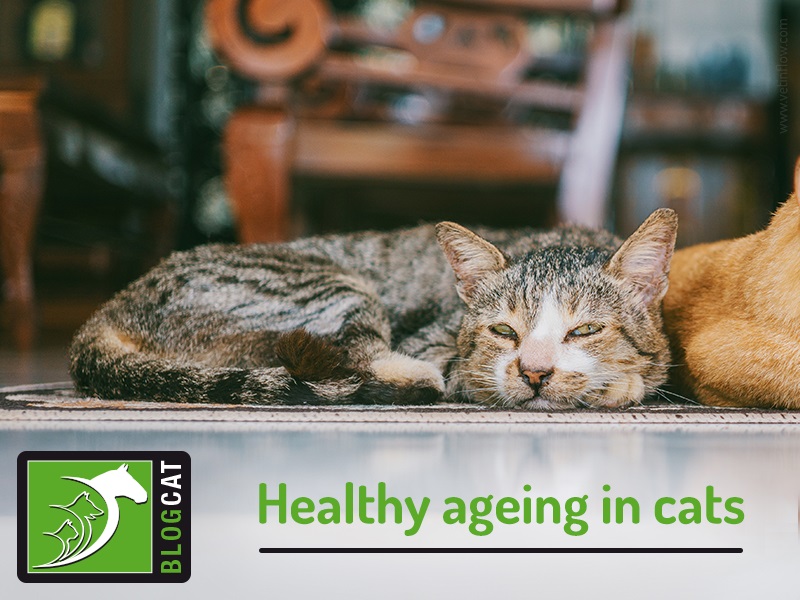
Healthy ageing in cats

The advancements made in veterinary medicine as well as owners being more actively invested in making sure their cats' needs are met have made it possible for cats to live longer lives. As a result, a growing number of cats are reaching their golden years, and it is up to us to make sure they spend them happy and healthy.
Ageing is associated with changes that lead to decreased vitality and make our cats more vulnerable to illness. Unless they are due to disease and affect our cats' health and wellbeing, these alterations shouldn't be seen as negative or positive, they just represent a normal transition to a different life stage that requires some adjustments.
You may notice changes in your cats' behaviour, such as sleeping for longer periods, changes in their appearance (like finding little 'freckles' in the coloured part of their eyes) and changes in the way they move about and react, such as being less mobile and seemingly less aware of their environment.
As you start noticing your cats displaying these changes, there are some things you can do to make their lives a little easier and promote healthy ageing.
- Acknowledge that your senior cats have different needs
Recognising that your cats will have different needs as they age and that these will change over time is the first step towards you helping them. By identifying what and how things are changing, you can provide adjustments in your cats' daily lives that are suited to their life stage. After 7 years of age, cats are usually considered mature and at 11 years old, senior. However, keep in mind that not all cats age at the same pace, so it is important to keep a close eye on them as they grow older to look for age-related physical changes but also changes in their habits.
- Visit your vet regularly
Regular check-ups will help diagnose any problems at an early stage which will usually make treatment more effective. A number of diseases are frequently diagnosed in older cats, such as diabetes, hyperthyroidism, and kidney disease, for example. Unfortunately, we all know cats are great at hiding that there's something wrong with them and these visits will help make sure everything is ok.
- Provide good nutrition and hydration
Again, a different life stage means different nutritional requirements and proper nutrition is one of the most important factors in keeping your cats healthy. There are diets specifically formulated for senior cats; however, you should consult with your vet to understand the best option for your them. If your cats have a medical condition, they might benefit more from therapeutic prescription diets than from a normal senior diet.
Encouraging drinking behaviour is also essential to keep them hydrated and promote kidney health as cats tend to neglect drinking even more as they age.
- Monitor your cats' weight
As cats are great at hiding signs of disease, carefully monitoring their weight becomes vital as sometimes weight variations will be the first (or only) indicator that something might be wrong. Gradual weight changes are not easy to notice from just looking at them, so you should weigh your cats frequently, and a 500g loss might not seem like much but, for a 5kg cat, it represents a significant 10% body weight variation. Keeping a register of your cats' weight is the easiest way to keep track of these variations and to see if something is wrong.
- Provide environmental enrichment
Physical and mental stimulation should always be an integral part of your cats' lives, just make sure you provide toys and activities appropriate to your older cats' different abilities.
- Make adjustments to their home environment
Given enough time, most older cats will develop arthritis which will decrease their mobility. If you have stairs at home, one thing you can do is make sure your cats' essentials are all on the ground floor feeding area, sleeping area, resting area and toileting area. You can also use ramps to facilitate access to higher spots and lower the entrance to the litter box for easier access. Grooming might also not be an effortless task for an older cat, so that is something where you can definitely help. Providing warmer, padded beds will also be highly appreciated as senior cats don't have the same capacity to keep their temperature stable as they did when they were younger.
We hope you find our tips helpful and that your cats enjoy their golden years :)
Would you like to know more about cats? Check our Feline Courses:
Feline courses
Published: 12 Feb 2019
Read the previous article: Prevention is the best medicine!

